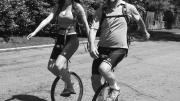On July 10, Philip Wharton ’82 and his daughter Sophie Wharton ’11 began a 100-mile, four-day journey through Montreal and neighboring districts in Quebec. Their vehicle of choice? The unicycle. The trip, dubbed “A Balancing Act,” raised more than $25,000 for the Central Asia Institute (CAI), which supports education for children in rural Pakistan and Afghanistan.
Sophie Wharton, a psychology concentrator, learned how to ride a unicycle at a circus camp during middle school and received one of her own for her thirteenth birthday. Philip Wharton rode a unicycle for the first time just two summers ago; he prepared for the 100-mile endeavor by commuting on one wheel from his home in Larchmont, New York, to the train station. Both father and daughter carried everything they needed with them on their backs, and they hope to make this self-proclaimed “crazy escapade” an annual event.
Though the Whartons have been involved in other charity efforts, this was the first one they organized themselves, and they wanted to do something unusual to better raise awareness and funding for the cause. “We thought that 100 miles would be a challenging but achievable goal,” says Sophie, “and we chose Montreal for our adventure because it has so many beautiful off-road trails suitable for long-range unicycling.”
“We were particularly inspired after reading the extraordinary story of Greg Mortenson (co-founder of CAI) in the book Three Cups of Tea,” she explains. “We believe strongly in the special role of education as the best way to improve the human condition, reduce intolerance, and promote peace over the long term.” Especially compelling was the unique philosophy of CAI, which since 1996 has built nearly 80 schools that have served more than 28,000 children, empowering local teachers and placing special emphasis on girls’ education. “They work with community leaders, including religious leaders, to build the schools, instead of imposing an outsider’s view of what is important,” says Philip.
Despite some torrential downpours (braved with the help of ponchos) and a few logistical and navigational difficulties along the way (they encountered various unmarked dead-end trails, for example), the Whartons were able to slow down and savor the final hours of their journey and reached the 100-mile mark with many lasting memories. “Although we had trained extensively, we were still in awe that we had actually succeeded, without injury or incident,” says Sophie. “The last day we rode the most beautiful trail, so it was a thrilling ending.”









